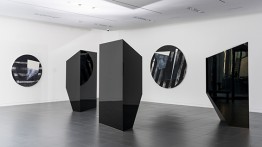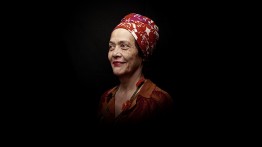An Evening with Torkwase Dyson and Françoise Vergès
Tuesday, April 2, 2019, 7 - 8:30pm
Distance and Perception in the Wake of Climate Change / Capitalocene, Waste, Race, and Gender – An Evening with Torkwase Dyson and Françoise Vergès
Artist Torkwase Dyson, the Spring 2019 Robert Gwathmey Chair in Architecture and Art at The Cooper Union, and writer Françoise Vergès, featured lecturer in the Spring 2019 IDS Lecture Series, will speak about their work which touches on race, sustainability, and access to equitable space. Their talks will be followed by a conversation with moderators Mario Gooden and Omar Berrada, as well as an opening reception in the 41 Cooper Gallery, located at 41 Cooper Square, for Dyson’s new solo exhibition I Can Drink the Distance.
This event is co-sponsored by The Cooper Union’s Irwin S. Chanin School of Architecture and School of Art and The Architectural League of New York.
RSVP required. Following the lecture, an opening reception for Dyson's new exhibition will be held in the 41 Cooper Gallery.
Dyson spent her developmental years between North Carolina and Mississippi. Traversing these regions helped her develop a fundamental sensitivity towards urban development, southern landscape, and black spatial justice. During her years at Tougaloo College, where she majored in sociology and double minored in social work and fine art, she began to examine the spatial dynamics of black history and how these histories were connected geographically. Over the next 10 years, Dyson traveled to Africa and South and Central America to strategize with communities of color on ways to attain resource equality. During this time she earned her Bachelor of Fine Arts in painting from Virginia Commonwealth University and her Master of Fine Arts in painting from the Yale School of Art. In 2016, Dyson designed and built Studio South Zero (SSZ), a solar-powered mobile studio where the context of nomadicity became the framework for learning and making art about the environment. It was traveling with SSZ that inspired her experimental project The Wynter-Wells Drawing School for Environmental Liberation, where she explores contemporary theorizations of space, architecture, and the infrastructure of extraction economies. Dyson’s work has been exhibited at the Studio Museum in Harlem, the Whitney Museum of American Art, the Museum of Modern Art, and more. In 2016, Dyson was elected to the board of The Architectural League of New York as Vice President of Visual Arts.
Vergès grew up on Réunion Island, and has lived in Algeria, France, Mexico, England, and the USA. Her work as a journalist, scholar, and activist has been recognized internationally for the way it traces the persistence of colonialism into the present, maps out networks of transnational solidarity in the global south, and enacts an ethics of antiracist feminism. Her numerous books have tackled the ambiguities of abolitionism, colonial and postcolonial psychiatry, slavery remembrance, the processes of creolization in the Indian Ocean, and new forms of colonization and racialization, among other topics. She is also the author of documentary films on Maryse Condé and Aimé Césaire, and was project advisor for Documenta 11 in 2002 and the Triennale de Paris in 2011. In this talk, Vergès considers how Neoliberal capitalism produces waste—11 million tons a day according to the World Bank—and fabricates humans as waste. Studies have shown that waste disposal is racially distributed across the world: tons are shipped to the Global South adding to pollution of the soil and to health problems. Neoliberalism requires the cleaning of its spaces—offices, banks, hotels, airports—in order to function. It leads to a new division between clean/dirty: who has the right to green spaces, clean streets, clean water, spaces for rest, and who is denied these rights. Vergès will look at these accelerated transformations and analyze their gender, race and class combinations.
The Robert Gwathmey Chair, a rotating professorship in art and architecture, was established by Charles Gwathmey in 1993, in honor of his father, Robert Gwathmey, a professor of art at Cooper Union from 1942 to 1968.
The IDS Lecture Series at The Cooper Union is organized by Leslie Hewitt and Omar Berrada. The IDS Public Lecture Series is part of the Robert Lehman Visiting Artist Program at The Cooper Union. We are grateful for major funding and support from the Robert Lehman Foundation for the series. The IDS Public Lecture Series is also made possible by the New York State Council on the Arts with the support of Governor Andrew M. Cuomo and the New York State Legislature.
View the full 2019 Spring Lectures and Events List.
Located in The Great Hall, in the Foundation Building, 7 East 7th Street, between Third and Fourth Avenues






